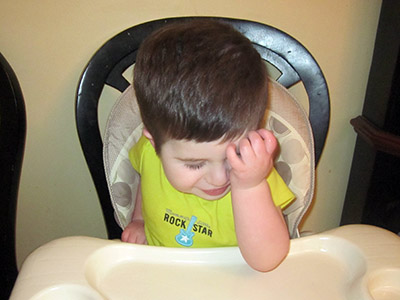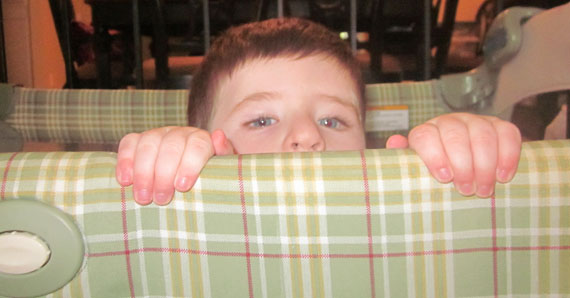Originally Published; September 18, 2017
When I write about my son’s Autism, the tone is usually pretty upbeat because we’re usually pretty upbeat. Through the years, I’ve come to understand the similarities and differences that he has with other children. I’ve learned to navigate those differences and realize that things aren’t as bad as I once feared they would be.
However, there was once a time when those fears were very real. Before anyone else ever noticed or joined me in my concerns, I silently watched as my child seemed to struggle with advances his sister easily made and displayed signs that, to me, were unmistakable.
I remember wincing as he would spin a toy on the ground and begin waving his hand in the air above it. To relatives, friends, and outsiders, though, he was fine. They saw no problems with anything he did. Hand-waves included. Once, an older relative gave him a big hug mid-hand wave, turned to me, and said:
Oh, he’s so cute. I love the way he just flaps his little hands around when playing with his toy.
To my silent horror, she began to imitate the motions as if it was something to celebrate. I smiled a frozen response but in my head, I was screaming.
Stop that! Are you crazy!? How is that good!? I spend my days obsessing about him doing that! Don’t you know anything about red flags!?
At that point, no one knew about the inner voice that was devouring me from the inside out. The fear I had that something was actually “wrong” couldn’t be spoken out loud because then it would come true. If I could just pretend along with everyone else, then it would all be fine. Even if it’s not fine, if I was the first person to mention it, then maybe it would somehow be all be my fault.

Of course, none of my logic made sense. Even worse was that the constant haze of worry I was in forced me into unwinnable situations that I never imagined I would be in.
A perfect example would be the Music Together classes that Lucas and I attended when he was about two. Each week, much like we did with his sister, we would go to a small music studio and sit in a circle while a teacher demonstrated instruments. I’d help him tap a drum and pay insanely inflated prices for CDs. It’s something you’re supposed to do with babies. We had babies, so that’s something we did.
When the class would start, he would do very little in terms of participation. Kids half his size crawled over to strum the guitar while looking at their parents with a smile. My son would dart for the door or lay down on the floor with his hands cradling his head as if he was about to fall asleep. I would chuckle uncomfortably, sit him up, and say something like, “Come on, buddy. It’s not bed time. It’s music time.” It was a struggle to keep him interested. I always felt all the eyes in the room on us.
One day, the teacher decided to tell a story about her own baby patting along to the rhythm of a song. The idea was to explain that children, even very young, can react to music. The message was nice. The way she presented it wasn’t.
She was sitting on the floor tapping her little hand. I looked over and thought, “Oh my God! What is she doing? Why is she tapping? Is that a stim thing? Does she have disabilities? Oh no!” Then I saw that she was just listening to the music and I said, “Phew. Thank God. That’s all it is.”
My heart sunk in my chest as the room erupted with young-parent laughter. At that moment, I didn’t know what to do. A voice in my head told me to scoop Lucas up and dash from the room. The caveman cortex in my brain had all sorts of ideas that involved kicking Tupperware boxes filled with maracas at her on the way out.
Instead, I sat. I endured the rest of the class in stunned silence and never came back.

She hadn’t directed her words at us or said it to hurt me. How could she? She didn’t know. No one did. Sure, she should have thought for half-a-second before speaking to a group of people she knows next to nothing about. And yes, she should have been lectured about why her speech was offensive. But it wasn’t my place yet. I wasn’t ready to be an advocate for my son with Autism because, at that point, I still wasn’t entirely sure I even had a son with Autism.
It takes a while to know that. Even after being diagnosed or going to a special school for children on the spectrum, you’re given mixed signals. Teachers, doctors, and administrators still urge you to be hopeful that things could suddenly change and you do just that. I did. While I came to accept that something was off in his early years, I told myself and others that he was simply “delayed”. Things would be just fine soon. He’ll catch up all at once. It’s just around the corner.
In the same way that you don’t realize how often people pat you on the shoulder until you get a fresh tattoo there, you don’t realize how often you might encounter a mental slap in the face during these times of inner guilt and turmoil. Do you know who slapped me in the face? Judge Judy.
As I cooked dinner, I had my iPad set up with the Judge’s program providing background noise. A plaintiff began to talk about her son, whom she claimed had been hurt by the defendant. The boy, slightly older than Lucas at the time, was five and didn’t speak. When asked why the mother mimicked my usual response.
He has delays.
Judge Judy’s eyes grew wide.
Madam! If he’s five years old and doesn’t talk, that’s more than just a delay!
Bam. Like a gavel to the face. All I needed was to drop an egg on the ground and have the yolk spell out, “Your kid has Autism”. At the time, I felt I just couldn’t escape it.
I did eventually escape it. Although, it turned out that it wasn’t his autism or special needs that I needed to escape. I needed to escape the darkness of uncertainty that convinced me things were going to be much worse than they turned out to be. It takes a while to realize that everything you fear isn’t all that bad. But it isn’t until those fears come true that you know that for sure. The days, months, and years before that finally happens can be maddening.
Sometimes worst-case scenarios become real-time realities. Even when things don’t turn out “fine”, they’re still fine. You see it when you get there. No predicted cases of doom and gloom ever factor in the love you’ll have for your child when those days finally arrive. No matter how dark your darkest days can be, the bond you have with your child will be the light that keeps you both moving forward.


You must be logged in to post a comment.